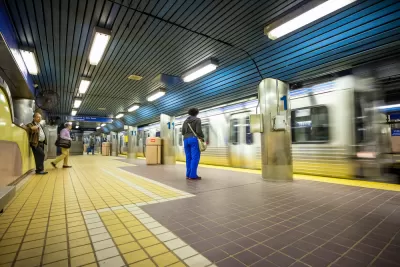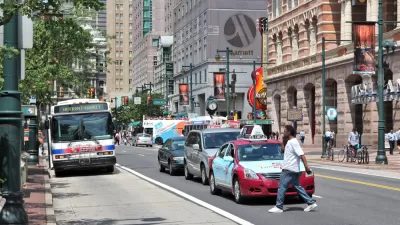Ride hailing apps have changed the way people travel. Though public transit may lose ridership to these services, transit should also learn from technological advancements and use those insights to improve transit service.

"After years of impressive increases, transit ridership tumbled by 6.3 percent last fiscal year on SEPTA and PATCO -- and that was before the Silverliner fiasco on SEPTA’s Regional Rail. Though the evidence is still circumstantial, many believe ride-hailing apps like Uber and Lyft are responsible for spiriting them away," Inga Saffron reports for the Philadelphia Inquirer. This trend is playing out in many cities around the country. Declines in ridership mean less funding for public transit and more traffic for all commuters.
Saffron argues that transit agencies like SEPTA have an opportunity to learn from their competitors by doing things like simplifying payment. SEPTA should also take declining ridership as motivation to improve service through proven best practices (like all-door boarding and removing little-used stops on bus routes) Saffron suggests.
FULL STORY: Ride-hailing apps are killing taxis. Is public transit next?

Planetizen Federal Action Tracker
A weekly monitor of how Trump’s orders and actions are impacting planners and planning in America.

Maui's Vacation Rental Debate Turns Ugly
Verbal attacks, misinformation campaigns and fistfights plague a high-stakes debate to convert thousands of vacation rentals into long-term housing.

Restaurant Patios Were a Pandemic Win — Why Were They so Hard to Keep?
Social distancing requirements and changes in travel patterns prompted cities to pilot new uses for street and sidewalk space. Then it got complicated.

In California Battle of Housing vs. Environment, Housing Just Won
A new state law significantly limits the power of CEQA, an environmental review law that served as a powerful tool for blocking new development.

Boulder Eliminates Parking Minimums Citywide
Officials estimate the cost of building a single underground parking space at up to $100,000.

Orange County, Florida Adopts Largest US “Sprawl Repair” Code
The ‘Orange Code’ seeks to rectify decades of sprawl-inducing, car-oriented development.
Urban Design for Planners 1: Software Tools
This six-course series explores essential urban design concepts using open source software and equips planners with the tools they need to participate fully in the urban design process.
Planning for Universal Design
Learn the tools for implementing Universal Design in planning regulations.
Heyer Gruel & Associates PA
JM Goldson LLC
Custer County Colorado
City of Camden Redevelopment Agency
City of Astoria
Transportation Research & Education Center (TREC) at Portland State University
Jefferson Parish Government
Camden Redevelopment Agency
City of Claremont





























